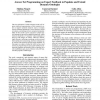101 search results - page 5 / 21 » Efficient Haplotype Inference with Answer Set Programming |
FLAIRS
2008
13 years 10 months ago
2008
The next generation of online reference works will require structured representations of their contents in order to support scholarly functions such as semantic search, automated ...
ICLP
2010
Springer
13 years 11 months ago
2010
Springer
Answer set programs with time predicates are useful to model systems whose properties depend on time, like for example gene regulatory networks. A state of such a system at time po...
BMCBI
2005
13 years 7 months ago
2005
Background: Recent studies have shown that the patterns of linkage disequilibrium observed in human populations have a block-like structure, and a small subset of SNPs (called tag...
AMAI
2008
Springer
13 years 7 months ago
2008
Springer
We introduce a knowledge representation language AC(C) extending the syntax and semantics of ASP and CR-Prolog, give some examples of its use, and present an algorithm, ACsolver, ...
JAIR
2008
13 years 7 months ago
2008
The notion of strong equivalence on logic programs with answer set semantics gives rise to a consequence relation on logic program rules, called SE-consequence. We present a sound...

